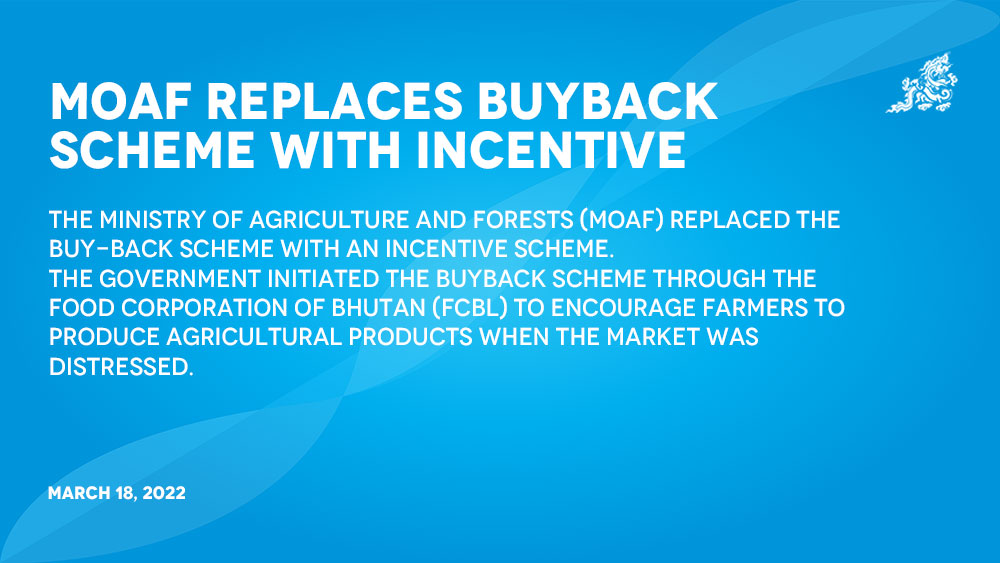Chhimi Dema
The Ministry of Agriculture and Forests (MoAF) replaced the buy-back scheme with an incentive scheme.
The government initiated the buyback scheme through the Food Corporation of Bhutan (FCBL) to encourage farmers to produce agricultural products when the market was distressed.
However, an official explained that the buyback scheme makes farmers lose market sensitivity and stunts innovation. “The buyback support becomes a regular feature in the agriculture sector and farmers, sometimes, take the government’s support as a right.”
He explained that if the government continues the scheme, farmers will lose sensitivity to the market and not focus on producing quality products. “People assume that the government will buy the produce irrespective of the quality.”
He claimed there were incidences where farmers hoarded produces to sell it during the off-seasons speculating better prices.
The official said that the farmers push to sell the produce off-season and lose incentives of the market and expects the government to intervene. “Farmers don’t face the reality of the market with support like the buyback scheme. If they did, they may come up with innovative ways of developing their product.”
The incentive scheme
Officials said the incentive scheme was introduced considering the need to reduce the compensation losses for the government, the low buyback price discouraging the farmers and affect market distortion.
It incorporates features of crop prioritisation and proposes enforcement in a decentralised mode through the dzongkhag administrations.
“The scheme is aimed at incentivising farmers to promote production of renewable natural resource (RNR) commodities that contribute towards achieving national food security, have better nutritional value, have potential for higher income to farmers, and enhance import substitution and export promotion,” the scheme document stated.
The scheme aims to compensate farmers if the market price of prioritised products is lower than the cost of production.
There are three categories of providing incentive schemes, where the first category includes factors like the RNR commodity (produce or crop) have higher nutritional value and income to the farmers, potential for import substitution and contribute towards food and nutrition.
The commodities in Category A will get 10 to 20 percent higher prices than the cost of production (COP). Chilli, however, gets 200 percent more than the COP.
Category B commodities are those produced on large scale with export opportunities and new products promoted by the technical departments for food security.
Incentive scheme price for category B commodities is equal to the cost of production.
Commodities that are commercially grown by farmers as a cash crop but do not necessarily contribute to import substitution nor are essential for dietary habits falls under category C which receives 30 to 50 percent incentive scheme price lower than the COP.
The ISP and commodity determination will be led by the Department of Agriculture and Marketing Cooperatives, (DAMC) and members from FCBL, Department of Agriculture and Livestock, planning and policy division, Ministry of Economic Affairs, and Ministry of Finance.
The task force will identify the commodities under each category and determine its annual ISP, minimum quantity and quality required in November of every year.
The scheme notes that to minimise the losses, the dzongkhag administration with the support of the ministry would invest in storage facilities, value addition and processing facilities, post-harvest infrastructure, market research and linkages including, markets in neighbouring countries.
Standard Operating Procedure for invoking ISP
Farmers have to approach gewog administrations, who would make an assessment of incentive scheme price (ISP) support needs and will submit a report to the dzongkhag administration.
The dzongkhag administration, upon receipt of the support request, will consolidate it from all the gewogs. If the ISP request is found valid, the administration will determine budget requirements and communicate with DAMC to invoke the scheme.
DAMC will review the dzongkhag’s report of invoking ISP, propose to the ministry for approval and facilitate budget release from the finance ministry to the dzongkhags.
The dzongkhag administration will identify the implementing partners (FCBL, cooperatives, private parties including youth groups) to procure and market the produce.
After approval of the budget, the dzongkhag administration will inform the farmers and assign the implementing partner for procurement of the commodities and marketing within and outside the country.
The dzongkhag administration and implementing partners will make payments to the farmers concurrent with the procurement of the produce.


